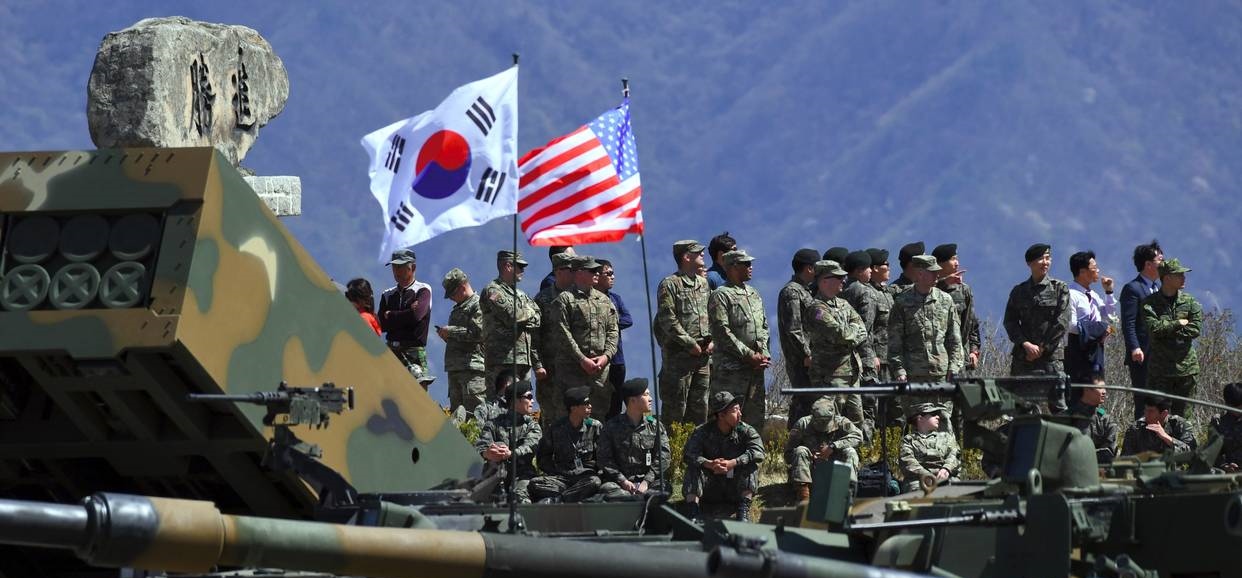“Ulchi Freedom” exercises on pause
June 20, 2018 | Expert Insights

The United States and South Korea have announced that they will be pausing the joint “war games” scheduled to take place this August. The Ulchi Freedom Guardian exercises are computerized command post military exercises that take place once a year.
The announcement comes a week after President Trump’s meeting with North Korean leader Kim Jong-Un in Singapore.
Background
In 1945, colonial Japan surrendered to the Allies and withdrew from the Korean peninsula. Korea was divided into two halves along the 38th parallel, and North and South Korea was formed. In 1950, North Korea, supported by China and Russia, invaded South Korea. The United Nations and US forces intervened on behalf of the South and the invading army was driven out during the Korean War. The two nations signed an armistice in 1953.
Today, South Korea (officially known as the Republic of Korea) is an important ally for the US in East Asia. The first joint military exercises between the US and ROK took place 16 months after the end of the Korean War in November 1955. Since then, Washington and Seoul have only deepened their military ties. The two nations carry out an average of three joint military exercises a year, including “Foal Eagle”, “Key Resolve”, and the “Ulchi Freedom Guardian.” Foal Eagle and Key Resolve exercises include live-fire drills, tanks, and warships. They have included up to 10,000 US and 200,000 South Korean troops.
To this day, there are 28,500 American troops in South Korea as part of United States Forces Korea (USFK). In 2016, the ROK operationalised the US Terminal High Altitude Area Defense (THAAD) system. South Korea is a major non-NATO ally to the US and falls under Washington’s umbrella of nuclear protection.
Recent developments with North Korea
In 2017, tensions between North Korea and the international community were at an all-time high. Pyongyang conducted over 20 missile test launches and conducted its sixth nuclear test. However, since January, Pyongyang appeared to have softened its stance, beginning a diplomatic outreach. On April 27th, North and South Korean leaders Kim Jong-Un and Moon Jae-In held a historic summit. The two leaders announced that they had agreed to end the 60-year Korean War. They signed the Panmunjom Declaration which agreed to denuclearise North Korea and cease “all hostile acts” in the peninsula. Kim Jong-Un’s international diplomatic standing has increased since then. The once-isolated leader has travelled to China thrice this year to personally meet President Xi Jinping and has reportedly received offers to meet with the Japanese and Russian heads of state later this year.
Analysis
On June 12th, Kim Jong-Un met US President Donald Trump in Singapore, the first meeting between a North Korean leader and a sitting US President. At the meeting, Kim and Trump signed a joint declaration promising to establish new US-DPRK relations and reaffirming the Panmunjom Declaration to world towards denuclearization. Following the meeting, President Trump said that the US-ROK war games were "inappropriate" and “expensive.”
On 17th June, Trump tweeted, “Holding back the ‘war games’ during the negotiations was my request because they are VERY EXPENSIVE and set a bad light during a good faith negotiation.” He added, “Also, quite provocative. Can start up immediately if talks break down, which I hope will not happen!” North Korean state media has criticised the joint exercises for years, using similar language and likening them to "gasoline on fire" and risking an "uncontrollable phase of a nuclear war".
The White House and the South Korean Defense Ministry have now announced that they will be suspending the upcoming war games between US and ROK. "Consistent with President Trump's commitment and in concert with our Republic of Korea ally, the United States military has suspended all planning for this August's defensive 'wargame' (Freedom Guardian)," said Dana White, chief Pentagon spokesperson. “We are still coordinating additional actions. No decisions on subsequent wargames have been made. There is no impact on Pacific exercises outside of the Korean peninsula.”
The Key Resolve and Foal Eagle exercises took place earlier this year. Ulchi Freedom Guardian exercises generally consist of computer-simulated defensive exercises and crisis training. The 2017 computerized command post military exercises included 17,500 US and 50,000 Korean troops. Australia, Canada, Colombia, New Zealand, Netherlands and the UK have participated in these exercises.
Pentagon officials are reportedly evaluating the cost of the exercises and determining which joint drills will be suspended. However, observers have pointed out that the exercises, which cost a few million, barely make a dent in the Pentagon’s $700 billion budget.
Assessment
Our assessment is that Kim Jong-Un appears to have gained what he wanted from the meeting with President Trump. We believe that the lack of a peace treaty after the Korean War has been a major justification for US military presence in the peninsula and joint exercises with Seoul. If the armistice ends, the US may no longer be able to justify the presence of its troops in South Korea in the long term. This would suit the agenda of both North Korea and its ally China. These exercises have not only been about military preparedness, but a political message to Pyongyang. By putting a hold on these exercises, Trump has sent a major signal to the North Korean leader.








Comments